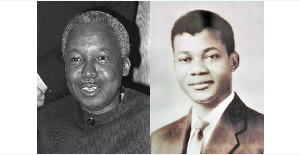A GNA Feature by Linda Asante Agyei, GNA Special Correspondent; Courtesy UNFPA, Ghana
Washington, June 18, GNA - In a developing country like Ghana, midwives are the front-line maternal and child health care providers. They give advice and lifesaving information to pregnant women; they counsel HIV-positive women on how to protect their unborn children from infections; they prepare women to give birth and plan their families; they help deliver babies; and they connect the greater community to health care.
This was exactly the services Hajia Mary Isaka, a 53-year-old Ghanaian Midwife from Zorkor, a village in the Upper East Region of Ghana, had been offering to her clients. In recognition of her invaluable work as a midwife in her community, Jhpiego, a global health non-profit affiliated with Johns Hopkins University, has honoured Hajia Mary Isaka with an international Midwife Champion of the Year Award. She completed her midwifery training in 1997, and has dedicated herself to improving the health status of people in her community and, through her work and activities, has helped save the lives of hundreds of pregnant women and their newborns.
The Midwife Champion of the Year Award recognizes the work of midwives in low-resource settings and the award is given to a midwife who has made an extraordinary effort in a developing nation, specifically in the training of midwives, educating communities, advocating for and implementing evidence-based midwifery care and innovating to save lives. As part of the award, Jhpiego provided 5,000 dollars to the recipient to support her work in the community. This was awarded her at the opening of the second World Conference on "Women Deliver" here in Washington on June 6. Hajia said, "In all my life I did not think anyone knew what I was doing outside of my village, let alone receiving an honour".
This year's recipient Mary Issaka, a Senior Staff Midwife from Bolgatanga, was selected from more than a dozen nominations that were solicited from the World Health Organization (WHO), United States Agency for International Development (USAID), United Nations Population Fund (UNFPA), United Nations Children's Fund (UNICEF) and International Federation of Gynecology and Obstetrics (FIGO). Madam Issaka was nominated by UNFPA for her work in the Bongo District near Bolgatanga in the Upper East Region. Expressing her gratitude, the award winner said, "I did not think anyone really cared about someone working in such a remote place. I didn't think the world would care about what I was doing. I am overwhelmed by the honour and the attention." Narrating her role and nature of work to the Ghana News Agency (GNA), Hajia said "I see myself a link between the communities and the policy makers. I always make sure I give an ear to the women in the community I serve, Zorko; identify their needs, and encourage them to go to the clinic when they are pregnant instead of risking their lives by delivering at home".
Hajia was posted to Zorko in 2003 where maternal mortality was quite high, coupled with high rate of teenage pregnancy. The only health facility was not well patronized; therefore, she did not have the exact statistics to give a clear picture as to what the real situation was. Roads were in bad condition and there was no means of transport to enhance the movement of patients and speed up supervision or follow-ups to patients at their various homes.
Zorko is a village with ill-equipped health centre and a community that women have very little power over their own lives. In fact, the woman has no much say when it comes to taking a decision on whether to seek medical attention and even whether to deliver in a health facility or at home. Mary Issaka has the warm, welcoming face of a mother and the fierce determination of a woman on a mission. The challenges she faced in Zorko in the Bongo District of Ghana were formidable - the maternal mortality rate in the area was three times the national rate, the local health centre lacked staff and hot water, and patients complained of poor service.
Despite the treacherous roads, which made the facility inaccessible to many women, Hajia was not deterred but was full of the "can do spirit". "I decided to meet the opinion leaders; the district assembly man, religious groups and any other group that I thought will help me achieve my aim and target of reducing the maternal mortality rate and control the high incidence of teenage pregnancy".
Hajia in consultation with the women in the community, realized that part of the reason why the women were delivering at home was to exhibit to their husbands and the entire community that they had been faithful to their husbands. Again, delivering at home, they will be getting family members to assist them and prepare them hot water to bath and offer them "Zomkom" drink prepared from millet flour.
For the hot water bath, the women in the area believe that delivery is dirt and therefore they need to bath with the hot water to cleanse them off the dirt. The Zomkom drink has a nutritious value which enhances the breast milk.
After talking and conferring with patients and staff, she re-organized the health centre's maternity ward, insisted on strict infection prevention measures, increased the number of delivery kits, provided hot water and offered the special post-birth drink popular with patients - Zomkom flour drink.
Hajia educated the women and the entire community on the need to attend antenatal, deliver in the health facility and attend post natal clinic. She entreated every family to go on bicycle to the centre and to let her (Hajia) know if their pregnant wife or sister could not be able to get to the health centre so she could arrange to have an old Toyota truck, which she borrowed from the Catholic Diocese to pick up the pregnant women who may be living far away to the health facility.
To make things easier and accelerate this initiative, midwife Hajia gave out her phone number to patients enrolled in antenatal care clinics for them to call her when the need arises.
This initiative had the number of women giving birth at the health facility more than triple. Since 2003, the midwife has single-handedly delivered 2,240 babies.
At her facility, Madam Issaka has ensured the staff's commitment to high-quality, effective and efficient health services; respect for their clients; adherence to punctuality; pleasant interpersonal relationships; and regular dialogue with patients. As a result, supervised deliveries rose from 14.3 per cent in 2003 to 66.4 per cent in 2005, a number that remains solid to this day.
Hajia continues to train community health nurses and works to establish innovative and effective health care programs throughout the Bongo District. To combat teenage pregnancy, Issaka formed five Virgin Clubs, which succeeded in greatly reducing teen pregnancy. She has provided training for peer educators, on-the-job training for community health nurses and extension workers, preparing them to participate in uncomplicated, supervised births, maintain records and network with community and health volunteers.
Mary Issaka is a role model for today's midwives in the developing world -engaging, dedicated, innovative and committed to improving health care services for women. She has helped save hundreds of lives. Addition to delivering babies, her work, which is featured in a recent show world wide, has contributed to a dramatic decrease in the number of unattended home births and adolescent pregnancies.
From reducing teenage pregnancy rates and training peer educators to reducing maternal mortality rates and reorganizing the labour ward at her local facility, Midwife Hajia's contributions have significantly improved the lives of women and families in the Bongo District.
Each year, more than two million women and newborns die needlessly due to preventable causes related to pregnancy, childbirth and post-partum conditions. Millions more suffer disabilities. Saving women's lives and improving their lives are key to achieving all the MDGs.
Every minute, a woman dies in pregnancy or childbirth and this adds up to more than 10 women over a generation. About 99 per cent of these women live and die in developing countries including Ghana.
Over the past decade, the global maternal death rate has remained stagnant and with only five years to the 2015 deadline to achieve the Millennium Development Goal 5, improving maternal health has made the least amount of progress and is the most under-funded of all the health related MDGs.
Midwife Issaka is resourceful, creative and committed to improving health care services. She has succeeded because she listened to patients' concerns, involved the community in the conversation, and delivered on her promises. "I see myself as a link between the communities and the policy makers and whatever I have to do to ensure their safety and good health, I have to do it. I deliver for women and their families", she added. 18 June 10
General News of Friday, 18 June 2010
Source: GNA
Ghanaian Midwife receives International Midwife Champion of the Year ward
Entertainment











